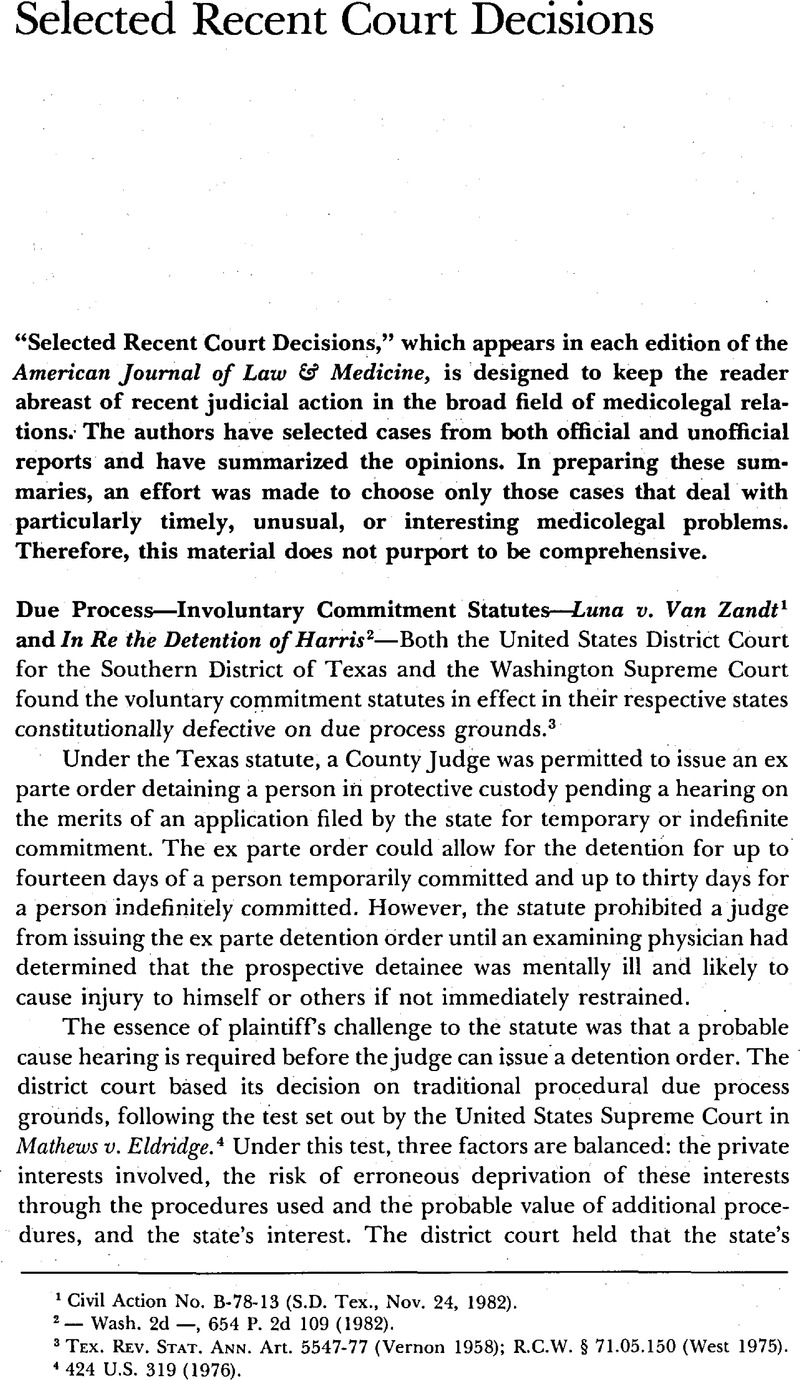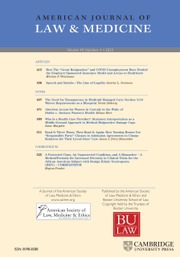No CrossRef data available.
Article contents
Selected Recent Court Decisions
Published online by Cambridge University Press: 29 April 2021
Abstract

- Type
- Medicolegal Reference Library
- Information
- Copyright
- Copyright © American Society of Law, Medicine and Ethics and Boston University 1983
References
1 Civil Action No. B-78-13 (S.D. Tex., Nov. 24, 1982).
2 — Wash. 2d —, 654 P. 2d 109 (1982).
3 Tex. Rev. Stat. Ann. Art. 5547-77 (Vernon 1958); R.C.W. § 71.05.150 (West 1975).
4 424 U.S. 319 (1976).
5 See Boddie v. Connecticut; 401 U.S. 371, 379 (1971).
6 The period of initial detention is 72 hours.
7 No. 47805-8 (Wash. Dec. 2, 1982).
8 Id.
9 90 N.J. 550, 449 A.2d 7 (1982).
10 In re Polk License Revocation, 178 N.J. Super. 191, 194 (App. Div. 1981).
11 In re Pennica, 36 N.J. 401, 419, 177 A.2d 721 (1962).
12 424 U.S. 319 (1976)
13 691 F.2d 678 (1982).
14 The trustees cited federal legislation up to but not including the National Health Planning and Resources Development Act of 1974, 42 U.S.C. §§ 300k-300n (1976 and Supp. Ill 1979), which was passed after the alleged violations occured.
15 691 F.2d 678, 684-85.
16 The Court of Appeals for the Fourth Circuit indicated in dicta that it considered its holding to be consistent with National Gerimedical Hosp. and Gerontology Center v. Blue Cross of Kansas City, 452 U.S. 378 (1981).
17 117 Mich. App. —, 323 N.W.2d 629 (1982).
18 118 Mich. App. 740, 325 N.W.2d 558 (1982).
19 116 Mich. App. 179, 321 N.W.2d 781 (1982).
20 118 Mich. App. 395, 325 N.W.2d 435 (1982).
21 Hood-McNeely-Geake Malpractice Arbitration Act of 1975, Mich. COMP. LAWS §§ 600.5040-.5065 (West Supp. 1982).
22 Id. at § 5041(1).
23 Id. at § 5041(2).
24 Id. at § 5041(3).
25 Id. at § 5044(2).
26 Id. at § 5044(3).
27 Id. at § 5044(5).
28 Id. at § 5045.
29 Id. at §§ 5043-5050.
30 Strong v. Pontiac General Hosp., 117 Mich. App. —, 323 N.W.2d 629 (1982).
31 Id. at —, 323 N.W.2d at 630, citing Jackson v. Detroit Memorial Hosp., 110 Mich. App. 202, 312 N.W.2d. 212 (1971); Piskorski v. Art Centre Hosp., 110 Mich. App. 22, 312 N.W.2d 160 (1971).
32 107 Mich. App. 91, 309 N.W.2d 575 (1981).
33 107 Mich App. 110, 309 N.W.2d 910 (1981).
34 These rights are provided for in Mich. Comp. Laws §§ 600.5043, .0549, and .5050.
35 Id. at §§ .5044(5) and .5057, respectively.
36 Moore v. Fragatos, 116 Mich. App. 179, 321 N.W.2d 781 (1982). The court expressly disavowed reaching the issue of whether the act itself is unconstitutional. Id. at —, 321 N.W.2d at 784. It is submitted, however, that a finding that the act does not adequately insure knowing and voluntary waiver of the constitutional right to trial constitutes a violation of due process that should render the arbitration act unconstitutional.
37 Id. at —, 321 N.W.2d at 783.
38 The court, in a footnote, acknowledged that the information it required was largely set forth in the patient information booklet mandated by the statute. See id. at—, 321 N.W.2d at 787 n.11. The court noted that the patient was required to make a decision about signing the agreement prior to any opportunity to read the booklet, and furthermore, that a patient had no realistic incentive to read it. Consequently, the court concluded that defects in the information brought to the patient's attention prior to his signing the agreement could not be cured through disclosures made in the booklet. The court did not consider the sixty day revocation period in reaching this conclusion.
39 See Brown v. Siang, 107 Mich. App. 91, 309 N.W.2d 575 (1981).
40 Strong v. Oakwood Hospital Corp. 117 Mich. App.—,—, 325 N.W.2d 435, 437(1982).
41 692 F.2d 641 (9th Cir. 1982).
42 29 U.S.C. § 651-678 (1970).
43 29 C.F.R. § 1919.95 (b) (1) (1981).
44 452 U.S. 490(1981).
45 29 U.S.C. § 652(8).
46 692 F.2d at 649 n.9, citing RMI Co. v. Secretary of Labor, 594 F.2d 566 (6th Cir. 1979), International Harvester Co. v. OSHRC, 628 F.2d 982 (7th Cir. 1980), and Turner Co., Div. of Olin Corp. v. Secretary of Labor, 562 F.2d 82 (7th Cir. 1977).
47 549 F. Supp. 85 (W.D. Washington 1982).
48 51 U.S.L.W. 2200 (Mo. Ct. App. E. Dist. 1982).
49 29 U.S.C. § 794.
50 51 U.S.L.W. 2200 (Mo. Ct. App. E. Dist. 1982).
51 29 U.S.C. § 651.
52 29 U.S.C. § 794.
53 29 U.S.C. § 706(7)(B) states that a person is a “handicapped person” under 29 U.S.C. § 794 if that person has a physical impairment which substantially limits one or more of his or her major life activities. Plaintiffs hypersensitivity to smoke was found to limit at least one of his major life activities, that is, his capacity to work in an environment which is not completely smoke-free.
54 W. Prosser, The Law of Torts 526 (4th ed. 1971).
55 Public Health Service, U.S. Department of Health, Education and Welfare, Smoking and Health ch. 1 (1979); Public Health Service, U.S. Department of Health, Education and Welfare, The Health Consequences of Smoking: A Report to the Surgeon General (1975).
56 Ga. Sup. Ct., 296 S.E.2d 693 (1982).
57 17 Cal. 3d 425, 551 P.2d 334, 131 Cal. Rptr. 14 (1974).


